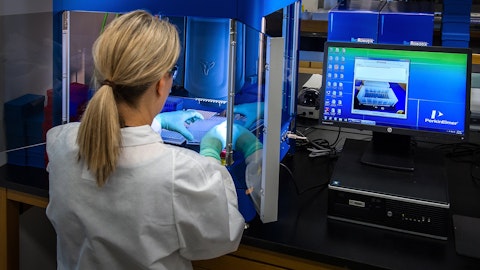The team that works on selling commercial data, working with the team that is talking to the client about analytics, working with the team who’s talking to medical affairs about expert data, working much more closely together and coordinating on the opportunity to really expand those relationships. The other way it’s helped is to really create a better map of who are the influencers for any given decision and be sure that we’re getting ahead of talking to those clients about the ways we can help them. So, if down the line, there’s a budget mandate or a CFO that steps in with something, we have a broader bench of support and potentially a broader bench of support across the organization even in other therapeutic areas or other departments. So, that’s something that I think in this environment is going to be really helpful to us.
The other thing that we’ve done a lot of is continue to verticalize. And by that, I mean really organizing our commercial efforts and our expertise that supports our commercial teams around each vertical. And what that lets us do is speak more the language of our clients. We’ve always done that really well and diversified because that’s kind of the history of the company. But as we’ve gotten bigger in provider and life sciences, those are two places where we’ve really gotten much better at speaking about the use cases that we can generate. And we have a lot of the use cases based on acquisitions and new products that we’ve built over the last couple of years. And so really getting the teams able to articulate the value and the ROI of these solutions and how that fits into our clients and can meaningfully inflect their business and that’s going to help.
So, in an environment like this, people want to know they’re going to get ROI. They want to understand it on their terms. They want to hear confidence from our team about the value we’re going to deliver and I think that will really help. Sorry for the long answer, but at the end of the day, when people start wanting to invest in growth and make the decision that they want to put dollars behind growing their business, we’re still very favorably positioned because we can accelerate that and deliver a lot of value. So, again, I’d love a little help from the macro environment. We’re not assuming it but when and if it comes, it will certainly speed things back up on the cycle front.
Craig Hettenbach: Got it. And then just my second question a year into Analytical Wizards. Just would like to hear how it’s performing versus the initial expectations. And I know Monocl was a deal that performed very well. And so if there’s any similarities or differences between how those deals have kind of progressed.
Robert Musslewhite: Yes, I think both just a quick refresher, both have been — they’re pretty similar types of acquisitions. They each brought a new capability. Monocl brought incredible key opinion leader and expert data that we could put into our broader Atlas Dataset and use across the business and then our commercial teams could help accelerate the sale of Monocl products. Analytical Wizards is really the same thing. They brought us a rapid, easily configurable analytic capability that’s data-agnostic, so it doesn’t have to require a client to buy Definitive data. Of course, we’d like them to, but it lets us serve clients that might not have our data yet, and brought a really strong analytical capability, particularly in biopharma.





